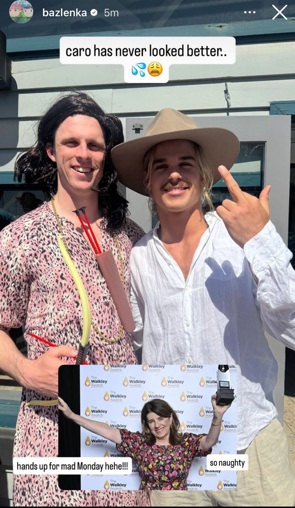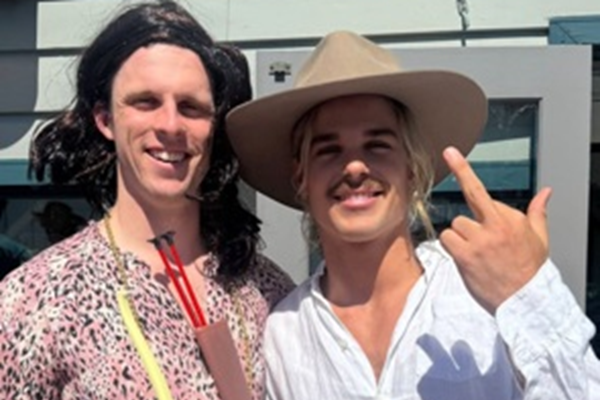Bailey Smith, one of the AFL’s most prominent young stars, has once again found himself at the centre of controversy.
During Geelong’s Mad Monday celebrations, Smith shared a now-deleted Instagram post featuring teammate Max Holmes dressed as veteran journalist Caroline Wilson. The costume mimicked an outfit Wilson wore to the Walkley Awards and included a bow and arrow referencing her ‘Caro’s Arrow’ segment.
Smith captioned the image with ‘Caro has never looked better’ and added the sweat droplets emoji widely recognised for its sexual connotation, as l found out when l googled its meaning. This was not just a tasteless joke; it was a targeted, misogynistic swipe at a respected female journalist who had rightly criticised Smith for verbally abusing a female photographer earlier in the month.

The incident with the photographer, Alison Wynd, occurred during an open training session. Smith lashed out at her with an expletive-laden tirade, accusing her of baiting him and demanding she delete photos of him receiving treatment. He later apologised—via text message. A cowardly move that speaks volumes about the lack of accountability and respect for women in the AFL. Geelong coach Chris Scott was also forced to personally apologise to a junior female AFL staffer after a post-match outburst reportedly left her in tears, further underscoring the AFLs troubling pattern of disrespect toward women.
Mad Monday has long been a contentious tradition in AFL culture, often associated with drunken antics and inappropriate behavior, as evident by some of the pictures being shared on social media. But Smith’s actions go beyond the usual revelry. They reflect a deeper issue: the normalisation of misogyny in Australian football. Why is it that criticism of women, especially those in media, so often takes a sexualised form? Why are gestures like flipping the bird and using suggestive emojis considered acceptable responses to professional critique? This kind of rhetoric is disturbingly common on social media, where women, particularly those in public-facing roles, are routinely subjected to sexualised insults and degrading commentary simply for expressing opinions. It reinforces a culture where women are not only dismissed but demeaned, reducing legitimate criticism to a punchline rooted in gendered abuse.
Smith’s behavior is particularly concerning given his massive social media following—over 400,000 on Instagram alone. Young fans idolise him, and his actions send a dangerous message: that it’s okay to demean women, that mental health struggles excuse misogyny, and that talent on the field outweighs character off it.
Smith has been vocal about his mental health journey, including a raw admission that he spent time in a psychiatric facility during a dark period in his life. Kudos to him for speaking up as mental health in young men is a critical issue that needs more open discussion. But vulnerability does not absolve responsibility.
His now-deleted posts referencing drug use (“nose beers”) and mocking respected figures like Caroline Wilson with sexualised emojis show a pattern of poor judgment. Social media has become a breeding ground for gendered abuse, and Smith’s posts, whether intended as jokes or not, contribute to a culture where women are routinely sexualised and ridiculed. Studies show that over 85 per cent of sportswomen experience online harm, including sexual harassment and misogynistic trolling. The AFL has a woman problem, and its high time we stopped turning a blind eye to it.
Despite multiple incidents, including obscene gestures toward fans and inappropriate social media posts, Smith has faced minimal consequences. The AFL’s response has been tepid at best. No formal sanctions, just private apologies and vague statements about club culture. This lack of accountability perpetuates the idea that star players are untouchable, that their behavior can be excused if they perform well.
Caroline Wilson has been a trailblazer in sports journalism, often facing backlash simply for doing her job. Her criticism of Smith was valid and necessary, yet his response was to mock and sexualise her. This is not just disrespectful it’s emblematic of the broader challenges women face in male-dominated industries. Women in media deserve respect, not ridicule. They deserve to be heard, not harassed.
The AFL must do better. It must hold players accountable, not just for their performance, but for their conduct. It must foster a culture that respects women, both on and off the field. And it must recognise that the actions of its players have real-world consequences, shaping the attitudes of fans and the future of the sport.
Bailey Smith may be a talented footballer, but talent does not excuse misogyny. It’s time for the AFL to take a stand not just with words, but with action. Because whether we like it or not, kids are watching. And they deserve better role models than this.


